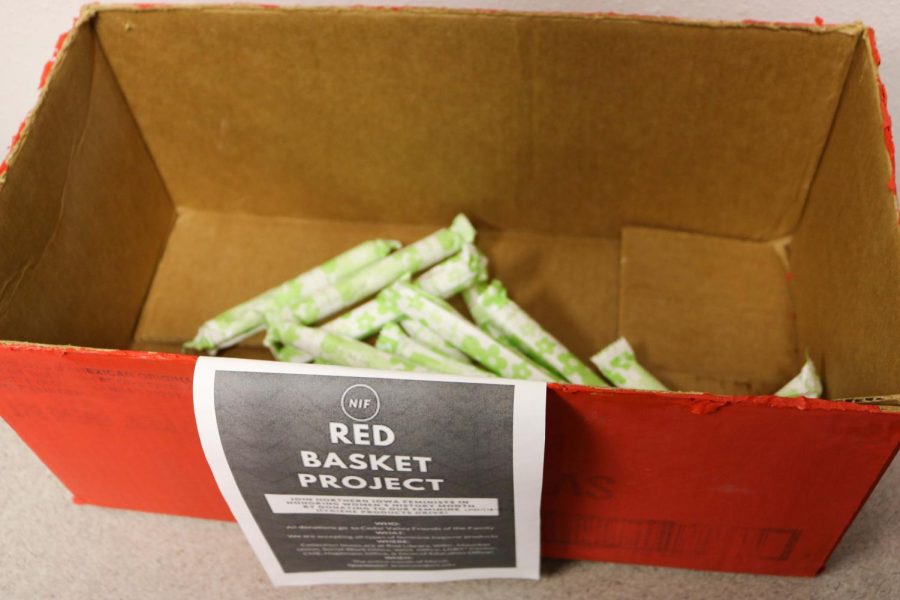UNI needs access to feminine hygiene products
Staff writer Blair Hines pens a guest column about the lack of access to feminine hygiene products on campus for UNI students and efforts like the “Red Basket Project” to make such products more available.
Apr 19, 2018
UNI students do not have free access to feminine hygiene products in public bathrooms on campus, even though other universities statewide, including the University of Iowa (UI) and Iowa State University (ISU), do provide them.
Shelley O’Connell, health promotion coordinator of Student Wellness Services, commented on the lack of funding UNI has in regards to free menstrual products.
“We do not offer free period products, and this is based on being unable to fund this initiative,” O’Connell said.
Many students, including the Northern Iowa Feminists (NIF), are talking about the lack of products for individuals who have their period. NIF has an event each year called “The Red Basket Project.”
According to a Northern Iowan article published on March 23, 2017, this project serves as a function to provide people with options for menstrual products in unfortunate situations. NIF holds various meetings about the disadvantage of the lack of access to these products.
Women have a slightly higher vulnerability to bacterial infection during their period, according to a Body Form article. They suggest that changing products four to five times a day is necessary for proper hygiene, or more frequently depending on how heavy a cycle is.
According to the Tax Foundation, the need to change products could be an issue for those who experience their period because of the high cost. This is due to the taxing of these products in particular states, including Alaska, Delaware, Montana and Oregon.
Former first lady Michelle Obama stated in a speech that a girl’s inability to afford menstrual products can affect their productivity in school. An article in Newsweek published on April 20, 2017 by Jennifer Wolf and Dasha Burns states that no one should have to miss school, risk their health or compromise their dignity because of menstruation.
Furthermore, the Tax Foundation identifies some states with high taxation on these products. Some of these states include, but are not limited to, California, Indiana, Rhode Island and New Jersey.
This could be seen as an issue for students in college who struggle financially in these specific states.
Every day, many people who live off and on campus struggle with funds to access period products because of the price.
According to a USA Today article published on Jan. 4, 2017 by Rachel Falek, tampons and pads can cost someone $7 to $10 per month. Over someone’s lifetime, however, it can amount to more than $18,000. In 2015, U.S. consumers spent up to $3.1 billion on pads, tampons and liners.
As opposed to UNI, UI has implemented free access to menstrual products in all bathrooms (men’s, women’s and gender inclusive), according to an article by Marissa Payne that appeared in the Sept. 22, 2016 edition of the Daily Iowan.
Furthermore, the Daily Iowan quoted the Feminist Union co-head at UI, Caitlyn Strack, as saying, “I think it would be great for [transgender students], not just for awareness, but because […] pads and tampons are very expensive, and that shouldn’t interfere with your attending class.”
Anna Nett, a former UNI student who is now a junior Spanish education major at UI, spoke about her experience at both universities.
“Having gone to a university with and without free period products, I can say the difference is night and day,” Nett said. “At UNI there was panic, and you had to ask for help; menstruation was far less discreet. At Iowa, all I need to do is find a bathroom.”
Nett went on to talk about the importance of having free products on UNI’s campus. She felt it was disruptive to women and queer people’s learning to have to change their undergarments or to have to search for feminine hygiene products.
Nett stressed the importance of access to menstrual products on UNI’s campus, saying, “People with periods could feel like they [are] being treated with humanity.”









